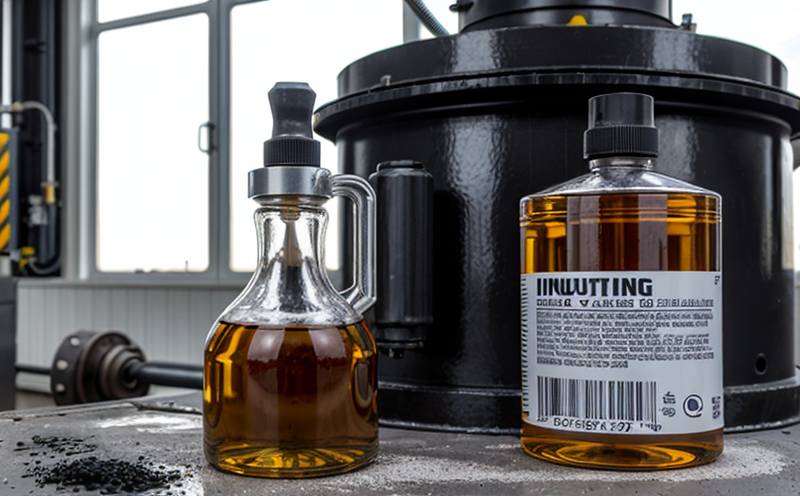ASTM D874 Sulfated Ash Content Testing in Oils
The ASTM D874 standard method is widely recognized and utilized by industries that require precise measurement of sulfur content, specifically the sulfated ash component, within petroleum-based products like oils. This test plays a crucial role in quality assurance and compliance for industrial lubricants, hydraulic fluids, greases, and other complex petroleum formulations where even small variations can impact performance.
The sulfated ash content is an indicator of the amount of inorganic substances present in the oil which are converted to ash when burned at high temperatures. This includes elements such as potassium, sodium, calcium, magnesium, and aluminum. Understanding this component helps in assessing potential wear particles from additives or contaminants that could affect equipment longevity and operational efficiency.
According to ASTM D874, the procedure involves igniting a precisely weighed sample of oil under controlled conditions until all combustible materials are consumed. The remaining residue is then weighed to determine its percentage relative to the original mass of the tested material. This simple yet precise methodology provides critical insights into the composition and quality of industrial oils.
The importance of this test cannot be overstated, particularly for industries reliant on precision machinery such as automotive manufacturing, heavy construction equipment production, and aerospace engineering firms. Accurate measurement ensures that lubricants meet stringent industry standards set forth by organizations like ISO (International Organization for Standardization), ensuring compatibility with existing systems while promoting longevity and reliability.
For quality managers responsible for maintaining optimal operational conditions across large fleets or facilities, knowing the sulfated ash content allows them to make informed decisions about maintenance schedules, replacement intervals, and overall resource allocation. Compliance officers also benefit from this information as they ensure adherence to regulatory requirements governing product safety and environmental impact assessments.
Additionally, R&D engineers can leverage these results when developing new formulations aimed at improving performance characteristics or extending service life by minimizing wear caused by abrasive materials present in the oil mixtures.
Why It Matters
The sulfated ash content test is essential for ensuring consistent quality and reliability of industrial oils used across various sectors. By accurately measuring this component, manufacturers can guarantee that their products meet not only internal specifications but also external regulatory standards like ISO 16385:2017 'Specification for Industrial Lubricants'. This ensures compatibility with existing machinery and systems, reducing the risk of premature failures due to incompatible additives or contaminants.
From a safety perspective, accurate sulfated ash content testing helps prevent potential hazards associated with improper lubrication leading to increased friction, heat generation, and subsequent wear on components. In extreme cases, this could result in catastrophic failure causing significant downtime and financial losses for businesses operating large-scale facilities.
The environmental aspect should not be overlooked either; by ensuring that industrial oils contain minimal levels of harmful substances when incinerated or disposed of properly, companies contribute positively towards reducing air pollution and minimizing ecological footprint. This aligns with global efforts to promote sustainable practices within manufacturing processes.
Why Choose This Test
The ASTM D874 sulfated ash content test offers several advantages over other methods available for measuring sulfur compounds in oils:
- Precision: The standardized procedure ensures consistent results across different labs and facilities, enhancing reliability.
- Compliance: It aligns perfectly with international standards such as ISO 16385:2017 ensuring that your products meet global quality expectations.
- Ease of Use: The straightforward nature of the test makes it accessible even for laboratories without extensive technical expertise, saving time and resources.
- Reproducibility: Results obtained through this method are highly reproducible, allowing for accurate comparisons over time or between batches.
In addition to these benefits, choosing ASTM D874 also demonstrates a commitment to excellence in product development and manufacturing. It shows that you prioritize customer satisfaction by providing consistently high-quality products that meet industry benchmarks.
Competitive Advantage and Market Impact
The ability to accurately measure sulfated ash content using ASTM D874 provides significant competitive advantages for companies operating in the industrial lubricant sector. Here's how:
- Better Understanding of Product Composition: Accurate measurements enable manufacturers to better understand and control the composition of their products, leading to improved formulation and quality.
- Enhanced Customer Trust: By demonstrating adherence to rigorous testing protocols, companies can build trust with customers who value transparency and reliability.
- Innovation Opportunities: Understanding specific components allows for targeted innovation efforts focused on enhancing performance or reducing environmental impact.
- Regulatory Compliance: Ensuring compliance with international standards helps avoid costly penalties and maintains good standing with regulatory bodies worldwide.
These factors contribute to a stronger market position by differentiating products in terms of quality, reliability, and sustainability. Companies that embrace ASTM D874 testing are more likely to attract loyal customers and secure long-term contracts based on proven performance metrics.





